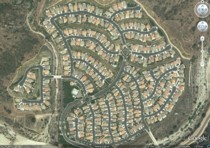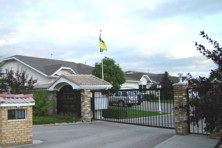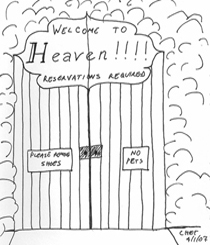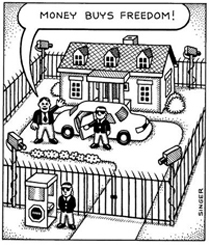Gated Communities
Gated Communities are a form of residential community containing controlled entrances for pedestrians, bicycles, and automobiles. More than 7 million households — about 6% of the US total - are in developments behind walls and fences. About 4 million of that total are in communities where access is controlled by gates, entry codes, key cards or security guards. Gated communities usually consist of small residential streets and include various amenities. The popularity of gated communities is on the rise nationwide in the US., according to developers and housing experts (Wikipedia, El Nasser 2002).
Reasons for living in Gated Communities
- "It feels clean and safe."
- Gated access is "a safety issue not so much from criminal elements [...]. It limits the amount of people who can come in."
- "It's nice, quiet, private."
- "You pretty much know everyone who comes in and out. There's less traffic."
- "It works for everyone, not just for the rich. Your children can actually play in the street like they used to in the olden days."
- "Some people think of gated as exclusive. Some think of it as security. But most think of privacy."
- Hope of rising property values, lure of prestige, desire to build barriers against a poorer neighborhood or one of different race (El Nasser 2002)
- The motivations for living in a gated community are mostly driven by the fear of crime and fear of differences (Le Goix 2003)

Gated Community in Los Angeles.
Source: Google Earth |

Entrance to a guarded gated community in Canada.
Source: Wikipedia |
Critics
There's no firm evidence of any general permanent reduction in crime in fully gated communities or in the barricaded streets of the Security Zone (Blakely, Snyder 1997).
Walls and gates don't always stop crime. In Atlanta, burglars targeted gated communities in 1995. They stole $1 million in jewellery, cash and silver from at least 90 homes before getting caught. Local gangs often use the maze of blocked streets to evade police and control their turf.
The health of neighborhoods depends on contact between people of all incomes and races. When higher-income people wall themselves from people who are poorer there is less chance that the surrounding area will improve. You create enclaves of stability in seas of decay. Gated communities are anathema to civic life.
What they do is isolate individual neighborhoods from each other and from the public realm (El Nasser 2002).
Without community, we have no hope of solving our social problems, or ever really gaining control of our deteriorating neighborhoods (Blakely, Snyder 1997).

Welcome to heaven.
Source: Chet Haase |

Money buys freedom.
Source: Andrew Singer |
When public services and even local government are privatised, when the community of responsibility stops at the gates, the function and the very idea of democracy is threatened. Gates and barricades that separate people from one another also reduce people's potential to understand one another and commit to any common or collective purpose. In short, gates reduce the opportunity for social contact, and without social contact, this nation becomes less likely to fulfill its social contract (Blakely, Snyder 1997).
